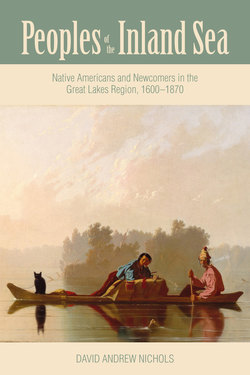Peoples of the Inland Sea

Реклама. ООО «ЛитРес», ИНН: 7719571260.
Оглавление
David Andrew Nichols. Peoples of the Inland Sea
Отрывок из книги
Peoples of the Inland Sea
Series editors: Paul Finkelman and L. Diane Barnes
.....
While defining my terms, I should note that Native American nomenclature is often a thorny subject, since Indians’ self-labels (or eponyms) often differ from the national names that their indigenous neighbors or European explorers gave them. Generally, I have employed the ethnic names most commonly found in anglophone records, as a courtesy to readers wishing to conduct more research in specific Indian peoples’ histories. Naturally, there are exceptions and qualifications to this rule. I employ the term “Ohio Iroquois” in referring to the so-called Mingoes, who received their derisive common name from the Six Nations Iroquois. The Ho-Chunks would not have appreciated the defamatory moniker that Anglo-Americans gave them, “Winnebago,” so I do not use it here. When referring to more than one of the Three Fires peoples, I use the name “Anishinaabe” (plural “Anishinaabeg”) and employ the modern spelling “Odawa” for the nation that Anglo-Americans spelled “Ottawa.” For the Indians of the Illinois confederacy, I generally use the plural form “Illiniwek” and the singular adjective “Illini.” American treaties generally use “Sac” and “Fox” to refer to the two interrelated nations that I spell “Sauk” and either “Fox” or “Mesquakie.”10
“Native American” and “American Indian” are not names that Indians used for themselves before the nineteenth century, although because one of the first pan-Indian movements on the continent originated in the Lakes country, I found it appropriate to use both labels here. In accordance with modern usage, I have reserved the unmodified term “American” for the citizens, generally white, of the republican empire that fought, traded with, and ultimately displaced so many Native Americans. As part of their larger nation-building project, Revolutionary and Jacksonian-era Americans took for themselves a national label that properly belonged to Indians, thereby engaging in a kind of discursive removal of indigenous Americans. This book cannot easily offer redress for this expropriation, but I hope that my readers will not take it for granted.11
.....